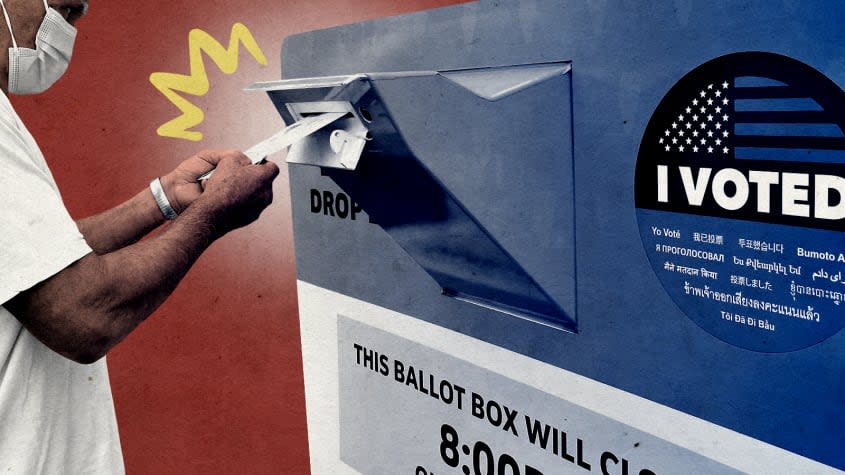How conspiracy theorists weaponized ballot boxes

Another election conspiracy quashed: There were no real problems with the use of drop boxes to collect ballots during the 2020 presidential election, an Associated Press investigation has found. A survey of voting officials found "no cases of fraud, vandalism or theft that could have affected the results," Anthony Izaguirre and Christina A. Cassidy write for AP.
The drop boxes are at the center of former President Donald Trump's ongoing (and false) efforts to declare Joe Biden's victory a fraud. Most recently, the film 2000 Mules made the case that Democratic fraudsters "were paid to illegally collect ballots and deliver them to drop boxes in key swing states ahead of the 2020 presidential election," Ali Swenson wrote in May, also for AP. The film — directed by Dinesh D'Souza, who received a pardon from then-President Trump in 2018 — has been widely and roundly debunked.
But proving a conspiracy theory is unfounded doesn't mean it will disappear. Drop boxes remain controversial — the Wisconsin Supreme Court just declared them illegal for that state's elections. Why are Democrats and Republicans struggling over drop boxes? Here's everything you need to know.
Why were drop boxes used so much in 2020?
The COVID-19 pandemic, obviously. Rather than make unvaccinated voters stand together in long lines on Election Day while a deadly virus was running rampant, officials in a number of states decided to use secure drop boxes — usually used for absentee ballots — as an alternative. There were also widespread concerns that the U.S. Postal Service wasn't up to the task of delivering ballots on time. And there was evidence they could be used safely: "In the 2016 campaign, one in six ballots cast were dropped in secure boxes — locked metal containers weighing as much as 600 pounds — with virtually no incidence of fraud," Glenn Thrush and Nick Corasaniti reported for The New York Times in 2020.
From the beginning, though, there was a partisan battle over the wisdom of using the drop boxes. Democrats and Republicans had already been battling over voter access issues for years, with Republicans citing nearly non-existent voter fraud in order to make it tougher to vote, while Democrats argued to make it easier. The 2020 election brought those fights to a new level. Even before the election, Trump claimed — without evidence — that the devices were insecure and would enable fraud. "Among other things, they make it possible for a person to vote multiple times," he tweeted. "Also, who controls them, are they placed in Republican or Democrat areas?" Republicans fought to limit the use of drop boxes, and succeeded in some GOP-controlled jurisdictions. Other states, like Pennsylvania, proceeded with their use. In the end, 10 states declined to make drop boxes available to voters.
How did that work out?
Lots of voters cast their ballots without going to the polls in 2020. According to the Pew Research Center, a small majority of Americans — just 54 percent — voted in person, while another 45 percent used either the drop boxes or mailed in their ballots. (Those votes were split fairly evenly between the mail and drop boxes.) The absentee voters were disproportionately Democratic: 58 percent of Biden backers voted using drop boxes or the mail, while just 32 percent of Trump voters did so. In an election where a few thousand votes in a few key states swung the election, that disparity probably made some difference. (Of course, many of those voters who used absentee methods might have decided to vote in person if that was the only option.)
That's probably why drop boxes have continued to play a central role in Trump's 2020 conspiracy-mongering. D'Souza's 2000 Mules movie has become popular among the former president's supporters. The problem with the accusations, though, is that it's difficult to find an expert who gives them any credence. "Ultimately, '2000 Mules' speculates that the so-called ballot-traffickers were dropping off fraudulent ballots — but the film does not prove this," Reuters reported in a May fact-check of the film, and noted that "more than 50 lawsuits brought by Trump or his allies alleging election fraud or other irregularities were dismissed by state and federal judges." The Washington Post's Philip Bump delivers a stark verdict: "So far, not only has no proof of rampant fraud been demonstrated, there hasn't been any evidence of even small-scale fraud."
So will voters get to use drop boxes in future elections?
Depends where you live — and if that's a state where Republicans run the government, it's likely your ability to use drop boxes has been diminished or eliminated entirely. (You can use this website from U.S. Voter to see if they're available where you vote.) Since the 2020 election, Georgia and Iowa have passed laws limiting the use of drop boxes, while "Louisiana, Missouri and South Carolina have passed laws effectively prohibiting drop boxes," Izaguirre and Cassidy report for AP. Even in states where drop boxes are in use, there might be controversy during the midterms. "Republican activists in Washington are organizing surveillance of ballot drop boxes," Jim Brunner reports for the Seattle Times, and that "has raised concerns about possible intimidation" during this year's midterm elections.
How future elections are affected by all of this remains to be seen. "Removing drop boxes will help rebuild the trust that has been lost," Georgia State Sen. Butch Miller (R) told States Newsroom's Kira Lerner. Others are skeptical, suggesting there wouldn't be much of an issue if Trump had won the 2020 election. From that standpoint, the problem was "making it easier for people to vote," said Amber McReynolds, an elections expert. Drop boxes, she said. were "politicized because people felt that it hurt them, or one person felt it hurt him."
You may also like
7 scathing cartoons about the Secret Service's deleted Trump texts
Liz Cheney calls out the '50-, 60-, 70-year-old men' hiding 'behind executive privilege'

